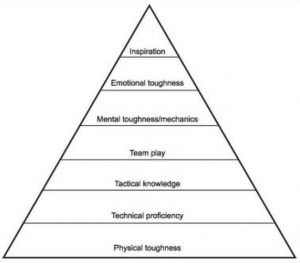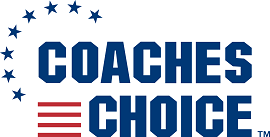
These notes on connecting mental and physical toughness are from Mental Toughness Training for Basketball by Mike Voight and Jeff House. I hope that you can use it as a model to think about ways to help your players improve. I like that it breaks down mental toughness into different capacities. Players have different mental strengths and weaknesses just like they have different strengths and weaknesses to their game.
“Nowhere is it more abundantly clear than in competitive sports that everything is interconnected. What you think, how you act, what you eat, how much you sleep, your fighting spirit, your fitness, your passion for life are all intimately connected”
—Jim Loehr, Ed.D., Mental Skills Trainer
Below are some questions for players to answer that can help them gain a better awareness of their present capacity level. Before a player can operate to his/her maximal capacities, he/she must be aware of his current level and how far it may be from his top effort.
Upon getting responses from each player and/or the team as a whole, individual/ team meetings with players can be conducted to discuss specific areas that players need to commit to improving, as well as to list the players’ areas of strengths. Coaches who take the time to talk about specific ways to maximize each athlete’s capacities show the athletes how committed they are in assisting the players in their pursuit.
The critical piece to this model is that your athletes and the team are being asked the “right” questions—questions that range across the seven different capacities.
Another exercise is to ask your players to determine the percentage of their mistakes that are due to each of these seven components.
Another activity is to have players brainstorm why they have not been able to accomplish their preferred goals due to barriers in these seven components. Then the players should be asked to brainstorm some solutions to these barriers. The feedback gathered during these exercises can be an
important foundation for subsequent team goal-setting sessions targeting solutions to common team problems and barriers.

Inspiration
What do you love about the game?
What are your reasons for playing the game and the position?
What makes you the happiest while playing?
What is your paying philosophy?
What drives you? What do you want to accomplish?
Emotional toughness
Are you a risk taker?
Do you deal well with changes?
Do you try new ways to improve your game?
Do you cope well with your frustration?
Mental Toughness for Mechanics
Do you use a pre-practice and pre-game routine?
Does your focus fade during practice or games?
Are you confident regardless of how you’re playing?
Do you stay positive (self talk, thoughts) when you’re not playing well?
Team Play
Are you honestly committed to the team’s goals?
Do you and your positional teammates think as one?
Do you make positive contributions to the team every day?
Do you feel connected to teammates and coaches?
Technical Knowledge
Do you know the demands of your position?
Do you know all of your positional responsibilities?
Do you know the positional responsibilities of teammates
do you look for your opponent’s weaknesses/tendencies?
[adinserter name=”Basketball in article display ad 2 rebecca”]
Technical Proficiency
Do you know your technical strengths and weaknesses?
Do you practice on your own to improve?
Do you know the specific technical elements that are faulty?
Are the majority of your practices quality sessions?
Physical Toughness
Do you adequately fuel and hydrate your body each day?
Do you ensure that you get proper sleep before games and practices?
Do you work to improve upon your flexibility?
Do you put in maximum effort on your conditioning training?
You can find out more about and purchase the eBook that this article is from at: Mental Toughness Training for Basketball







